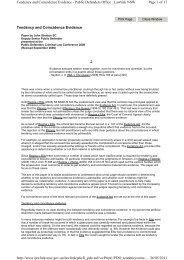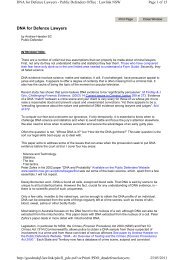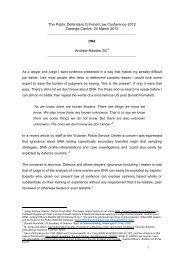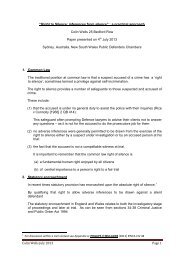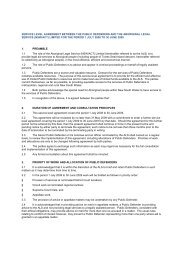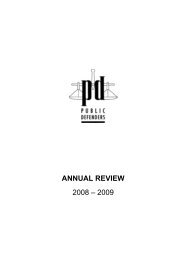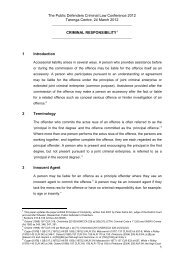Expert Evidence, by Dina Yehia SC - The Public Defenders
Expert Evidence, by Dina Yehia SC - The Public Defenders
Expert Evidence, by Dina Yehia SC - The Public Defenders
You also want an ePaper? Increase the reach of your titles
YUMPU automatically turns print PDFs into web optimized ePapers that Google loves.
for murder" at [71]. In R v Harris [2006] 1 Cr App R 5, the Court of Appeal stated that the<br />
guidance of Cresswell J was "very relevant to criminal proceedings and should be kept well<br />
in mind <strong>by</strong> both the prosecution and defence": at [273].<br />
[721] In Australia, the Ikarian Reefer principles were discussed <strong>by</strong> Heydon JA in Makita<br />
(Australia) Pty Ltd v Sprowles [2001] NSWCA 305; (2001) 52 NSWLR 705 at [79], <strong>by</strong><br />
Debelle J in James v Keogh [2008] SA<strong>SC</strong> 156; (2008) 101 SASR 42 at [67]-[72], and <strong>by</strong><br />
Austin J in ASIC v Rich [2005] NSW<strong>SC</strong> 152; (2005) 190 FLR 242 at 320-1 [333].<br />
[722] <strong>The</strong> applicant challenged the admissibility of the evidence of A/Prof Cross in this<br />
Court. <strong>The</strong>re is a live issue as to whether a failure to comply with the relevant obligations<br />
renders the expert's evidence inadmissible.<br />
[723] It was accepted <strong>by</strong> Austin J in ASIC v Rich at [256] that in this State, the law is not<br />
fully settled in relation to principles of admissibility of expert opinion evidence. Cresswell<br />
J's propositions were said <strong>by</strong> Austin J to have been "strongly influential upon the drafters of<br />
the <strong>Expert</strong> Code of Conduct, to which Pt 36, r 13C of the Supreme Court Rules refers."<br />
Austin J was of the opinion that neither the propositions of Cresswell J nor the Code of<br />
Conduct were to be construed as rules of admissibility of expert evidence: at [333]. He<br />
noted however, that the structure and content of the present law for responding to the<br />
problem of bias in expert evidence is "controversial and arguably unsatisfactory": at [335].<br />
[724] In Sydney South West Area Health Service v Stamoulis [2009] NSWCA 153 at [203],<br />
Ipp JA (Beazley and Giles JJA agreeing) said that the content of the duty of expert<br />
witnesses and the powers of the court to enforce that duty are yet to be finally determined.<br />
[725] <strong>The</strong> Code of Conduct is found in Schedule 7 to the Uniform Civil Procedure Rules<br />
2005. It applies to expert evidence in criminal proceedings <strong>by</strong> virtue of Part 75 Rule 3(j) of<br />
the Supreme Court Rules 1970 and applies to A/Prof Cross' reports and oral evidence.<br />
Clause 2 of the Code imposes on an expert witness "an overriding duty to assist the court<br />
impartially on matters relevant to the witness's area of expertise." Furthermore, there is a<br />
duty on the expert to state, "if applicable, that a particular issue falls outside the expert's<br />
field of expertise" and "If an expert witness who prepares an expert's report believes that it<br />
may be incomplete or inaccurate without some qualification, the qualification must be<br />
stated in the report." <strong>The</strong>re is also an obligation to disclose whether an opinion is "not a<br />
concluded opinion because of insufficient data or research or for any other reason." An<br />
expert report is not to be admitted into evidence unless an expert has agreed to be bound<br />
<strong>by</strong> the Code (unless the Court otherwise orders) nor is oral evidence to be received from<br />
that witness: r 75.3J (3)(ii), (c)(i).<br />
[726] In Dasreef Pty Ltd v Hawchar [2011] HCA 21; (2011) 243 CLR 588, the High Court<br />
unanimously held that where an expert purports to give evidence not based on his<br />
specialised knowledge, the evidence is inadmissible. <strong>The</strong> majority confirmed the relevance<br />
of the analysis of Gleeson CJ in HG v <strong>The</strong> Queen [1999] HCA 2; (1999) 197 CLR 414 at<br />
[41] and of Heydon JA in Makita at [85] when determining whether the opinion of a witness<br />
is "based on specialised knowledge or belief": Dasreef at [37]-[43] (French CJ, Gummow,<br />
Hayne, Crennan, Kiefel and Bell JJ).<br />
…<br />
[729] This is not to say that the <strong>Expert</strong> Witness Code of Conduct is merely aspirational.<br />
Where an expert commits a sufficiently grave breach of the Code, a court may be justified<br />
in exercising its discretion to exclude the evidence under ss 135 or 137 of the <strong>Evidence</strong><br />
Act. Campbell J adverted to this possibility in Lopmand when his Honour stated at [15]:<br />
"<strong>The</strong> policy which underlies the existence of Part 36 rule 13C is one which I should take<br />
into account in deciding whether [the expert evidence] should be rejected under section<br />
135." I respectfully agree with that approach. While there is no rule that precludes the<br />
admissibility of expert evidence that fails to comply with the Code, the Code is relevant<br />
when considering the exclusionary rules in ss 135-137 of the <strong>Evidence</strong> Act. <strong>The</strong> expert's<br />
"failure to understand his [or her] responsibilities as an expert" (Lopmand at [19]) may<br />
result in the probative value of the evidence being substantially outweighed <strong>by</strong> the danger<br />
that it might mislead or confuse or be unfairly prejudicial to a party.<br />
13



